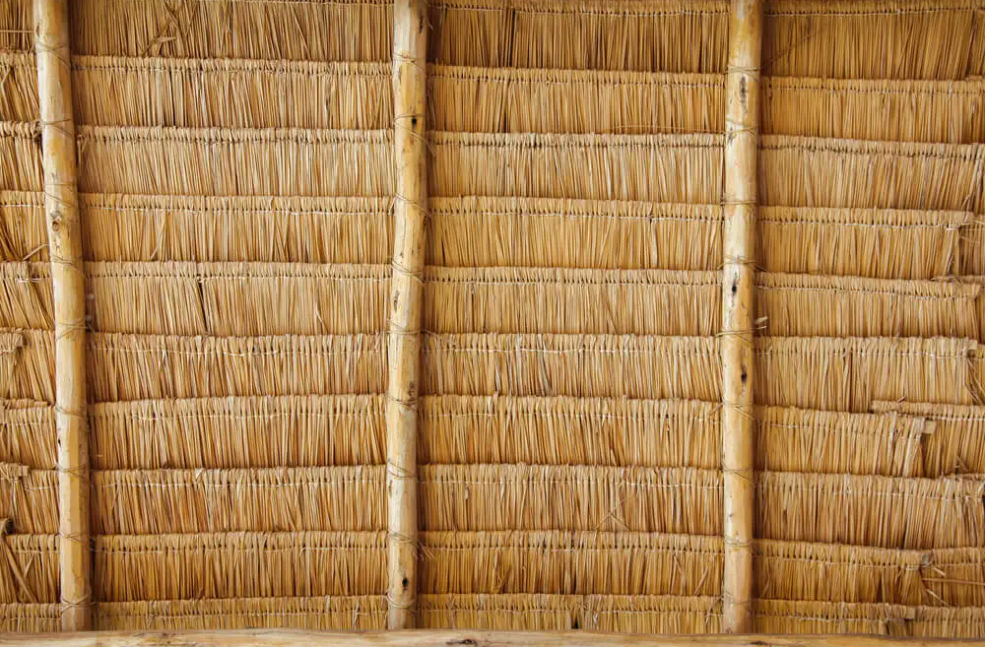Are you a homeowner that is looking to give your house a facelift? A thatch roof could be the perfect solution for this. Thatch roofs are made of reed or grass and wood. When properly dried and installed a thatch roof is waterproof and keeps your interior cool in summer and warm in winter. Thatch is a natural insulator, air pockets within the thatch insulate the building in cold and warm weather.
Laths are thin gum poles that are mainly used horizontally in lapas and thatch roofs. Laths, like gum poles, are also CCA treated to prevent rotting and wood borers such as termites. Another everyday use for laths in the making of screens, pergolas, and carports. Depending on the season and availability laths can range anywhere between 15mm and 45mm in diameter. If properly maintained and treated thatch roofs do not absorb too much water.
Thatched roofs look very attractive and a thatch roof is reminiscent of a beautiful summer holiday in the African bushveld. Most roofs can be thatched as long as the angle of the roof pitch is no less than 45 degrees. Anything less will not shed water as fast and this will reduce the durability of the thatch roof. If the roof is properly laid with good quality wood and the right grass is used a thatch roof can last 25-30 years. Since thatching laths use wood, a thatched roof is a very eco-friendly way of roofing a home.
The materials that are used in thatching laths are easily grown, replenished and the production of the roof does not harm the environment. Harvesting the grass does not require any heavy machinery (lowering the carbon footprint significantly). Although the harvesting and installation itself are labour intensive, the use of local communities for harvesting provides jobs and business opportunities in these areas. This makes installing thatched roofs far more eco-friendly and ethical than traditional roofs. This gives you peace of mind as a homeowner as you are being environmentally friendly whilst remaining trendy.
The wood used for the frame of the roof is also much easier to transport than steel structures. More wood can be transported per load than steel or aluminium. Wood is also kinder to the environment, as South African foresters have a policy of planting more trees than they use. Furthermore, wood that has been cut down actually traps carbon dioxide that has been absorbed and only releases it back when the wood is recycled to use as energy.
The required angle of the pitch of the roof makes is what makes it ideal to use as a loft space. The Wood Frame of the roof and the thatch makes it a comfortable and cozy space for a bedroom, giving the room a relaxing atmosphere. Thatch roofs are also ideal as a poolside shelter, for outdoor entertaining, and for beach huts.
The internal structure of the thatch roof is constructed with Gum Poles and Laths. Laths are thin gum poles that are fixed horizontally in lapas and thatch roofs with the grass placed over it, thus creating a more stable thatch roof.
Laths, like the poles, must be CCA treated to prevent rotting and pests like termites and borers. Laths are also used to make screens and for the roof of pergolas and carports. Laths can be found between 15mm and 45mm in diameter. For a panel of laths (to construct a pergola roof or a screen) about 30 laths are used per meter. Poles Galore supplies High-Quality Thatching Laths and Thatching Poles in Durban that are CCA and Creosote treated and our Laths are available in 3,0m and 3,6m.
Our gum poles and or wood poles comply with South African Wood Preservers Association requirements for thatch roofing materials and are SABS approved, they are SANS 457-2 or SANS 457-3 approved. Laths and poles comply with SANS 1288 and SANS 1783-4 (pine). All timber is preservative CCA treated in accordance with the requirements of SANS 10005.
We treat our wood right to the middle, thus ensuring stability and durability. CCA is a “Copper, Chrome and Arsenic” compound used to protect the wood. The Copper and Chrome compound in the mixture preserves the wood and Arsenic protects it from timber-eating insects. These poles are suitable to be in the ground and to get wet, ensuring that they do not get damaged by environmental factors.
It is important that you always purchase your gum poles and laths in the size that you require as cutting can expose an area where the treatment has not reached the wood. If the wood is cut try to ensure your supplier brushes your wood with CCA or creosote to retain the quality of the wood. You should refrain from planting a cut end of wood into the ground and always ensure that you use an antisplit plate when you cut a pole.
At Poles Galore we supply droppers which are used for the structure of thatched roofs and for screens, fences and in the garden. These are thin gum poles which are much cheaper than steel poles. Our experts at Poles Galore are always available to advise you on any project that you may be handling, and we will also give you expert advice all your thatching laths needs.


Recent Comments